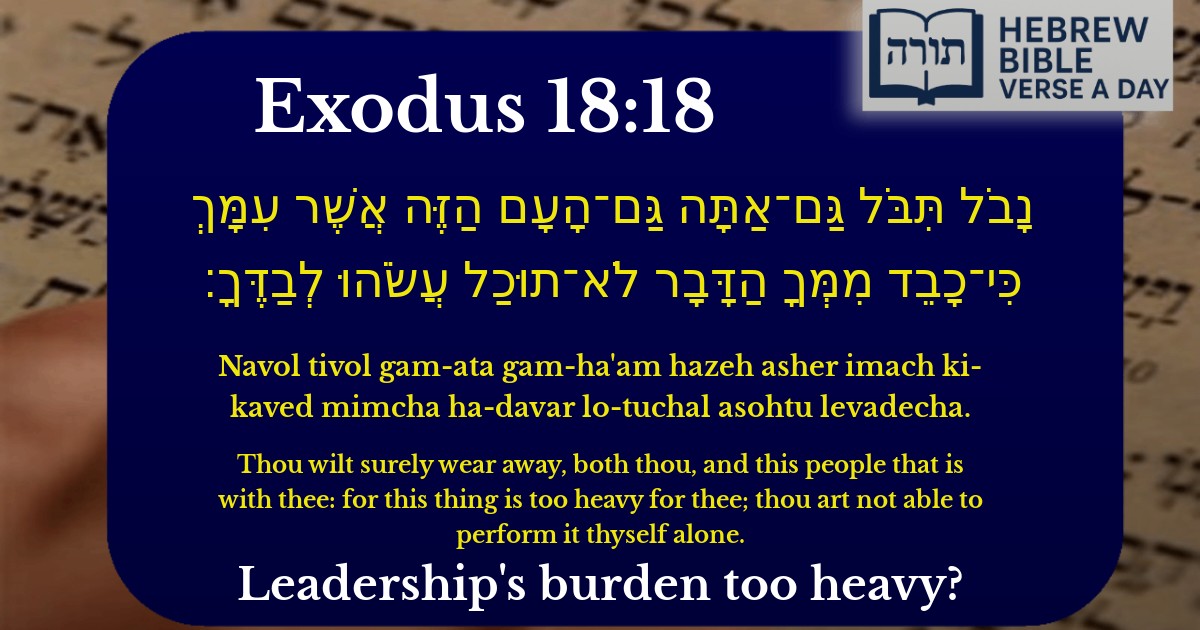Join Our Newsletter To Be Informed When New Videos Are Posted
Join the thousands of fellow Studends who rely on our videos to learn how to read the bible in Hebrew for free!
Hebrew Text
נָבֹל תִּבֹּל גַּם־אַתָּה גַּם־הָעָם הַזֶּה אֲשֶׁר עִמָּךְ כִּי־כָבֵד מִמְּךָ הַדָּבָר לֹא־תוּכַל עֲשֹׂהוּ לְבַדֶּךָ׃
English Translation
Thou wilt surely wear away, both thou, and this people that is with thee: for this thing is too heavy for thee; thou art not able to perform it thyself alone.
Transliteration
Navol tivol gam-ata gam-ha'am hazeh asher imach ki-kaved mimcha ha-davar lo-tuchal asohtu levadecha.
Hebrew Leining Text
נָבֹ֣ל תִּבֹּ֔ל גַּם־אַתָּ֕ה גַּם־הָעָ֥ם הַזֶּ֖ה אֲשֶׁ֣ר עִמָּ֑ךְ כִּֽי־כָבֵ֤ד מִמְּךָ֙ הַדָּבָ֔ר לֹא־תוּכַ֥ל עֲשֹׂ֖הוּ לְבַדֶּֽךָ׃


Context of the Verse
The verse (Shemot 18:18) is part of Yitro's advice to Moshe Rabbeinu regarding the burden of judging the entire nation of Israel alone. Yitro observes that Moshe's current approach is unsustainable and offers a solution to delegate leadership responsibilities.
Rashi's Commentary
Rashi explains the phrase "נָבֹל תִּבֹּל" (navol tivol) as meaning "you will surely wither away"—comparing Moshe to a leaf that withers and falls from a tree. He emphasizes that the burden of judging the people single-handedly would physically and spiritually exhaust Moshe, rendering him unable to continue effectively.
Rambam's Insight
In Hilchot Sanhedrin (2:7), Rambam derives from this verse the principle of delegating authority in leadership. He teaches that even a leader as great as Moshe must recognize his human limitations and establish a system of judges to share the responsibility, ensuring justice is properly administered without overwhelming any single individual.
Talmudic Perspective
The Talmud (Sanhedrin 8a) discusses this verse in the context of appointing judges. It highlights that Moshe's initial approach—judging every case personally—was unsustainable, as the people would "wait from morning until evening" (Shemot 18:14) for judgment. The Talmud concludes that proper judicial systems must be hierarchical to function efficiently.
Midrashic Interpretation
The Midrash Tanchuma (Yitro 10) elaborates that Yitro's advice was not merely practical but also spiritually necessary. By sharing leadership, Moshe would preserve his strength for the most critical matters, such as receiving Torah and guiding the nation in divine service. The Midrash compares this to a candle that can kindle others without diminishing its own light.
Key Lessons